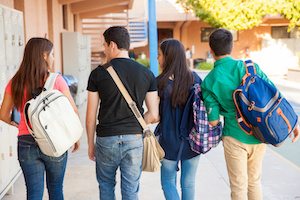Month: August 2017
High School Survival Guide – The Short Version
Are you a nervous high school freshman starting school? Or feel that even though you’ve been at your school, you still haven’t solved how to get the most out of it? High school can be stressful and terrifying if you’re new to it. But breathe easy, we have a quick and easy-to-follow high school survival guide for making this your best school year yet.

Here are our top tips to help you enjoy high school.
Get To Know People
First, get to know your peers. Even if you have friends from your old school, make new one! Work on finding good, trustworthy friends with similar values and interests as you. These friends will play a large factor in your high school life. You’ll find many study, social and extra-curricular opportunities to meet other students and get to know them.
Also, take time to get to know a few teachers and counselors too. They can help you in many ways your peers cannot, including advising you in choices you need to make and of course, during college application time.
Get Organized
Organization is not only key for high school survival, but it is a key life skill as well. Some people seem to be born organized, but the rest of us have to work at it. Luckily there are tons of helpful resources out there. It’s a no brainer that you should start with a planner and note down every “to do” (assignments, social events, sports events, everything!) as soon as you can before you forget it. School life and assignments are easier when you know what you’re supposed to be doing when.
Another tip: use your planner and your watch/smart phone to make sure you’re on time!
Stay Focused
Schoolwork should always be the number one priority. Sometimes your work may suffer if you are too distracted by extracurricular activities or just hanging out with friends too long (and let’s not forget the drama that goes on in high school!). It’s helpful to remind yourself that your future depends on you paying attention to your academics and doing your personal best!
Take Care Of Yourself
You’ve heard all of this before: eat right, get some exercise, get enough sleep. It’s true. Your mental and emotional well being is dependent on your physical health. So take time to take care of yourself – put in time for workouts (and sleep if you need to) in your planner! And while an occasional frappe won’t kill you, keep to the healthy stuff most of the time if you want to function at peak energy.
Ask for Help When You Need it
High school isn’t all fun and games. Sometimes, you may feel overwhelmed and stressed out. It could be due to the workload, or people dynamics or any number of issues. There are many resources at school to help you with whatever problem you may have, plus, you have made all these friends and connections with teachers and counselors! And of course, let’s not forget that your family could help you too. What’s critical is that you don’t have to bear it all on your own – share your problems and ask for help whenever you need it.
Make Time For Fun
Don’t take high school TOO seriously now. You’ll never have an opportunity like this to be around friends while living with your family. Join extracurricular activities that suit your passions (robotics can be cool!), go cheer at that football game with your friends and be social. You’ll find the time goes faster when you’re enjoying yourself and you’ll make memories that will last a lifetime.
So what’s the take-away? Focus on your priorities, but make time to enjoy the unique opportunities that high school provides you. Do you have any tips for surviving high school? Share with us!
31 Aug, 2017
What Should Be In My Backpack For School
It’s that time of year – summer is coming to an end, as is your summer break! You’d have received a list of “must-have” items from your school and started shopping for everything from textbooks to new pencils, but if you’re new to this, you’re probably wondering what else should be in your backpack for school.
The good news is that millions of students go through this every year and we can learn from them. Here’s our team’s simplified list of what to consider when readying your messenger bag or backpack for school.
 Keep your backpack light enough to to walk upright!
Keep your backpack light enough to to walk upright!
Let’s start with what will go into the “big pocket”.
Books
When packing books, remember to actively use your locker! Think about where your locker is located in relation to where your classes are for the day. If you can leave a few books in your locker, it will help lighten the weight of your bag. You can also store one or two books that you can read in your spare time, during study hall, lunch or at the end of the day.
Notebooks and Folders
How many notebooks do you need? You may need one per class. We also recommend putting loose sheets in folders so they don’t get crumpled. Again, you don’ t need to carry every notebook with you all day if you make use of your locker.</
Planner
Your school may be one that provides their students with a planner on the first day of school. If your school doesn’t, it is important that you get one to put in your backpack for school. A planner will help you keep track of your assignments, tasks and extracurricular activities. If you prefer a digital planner, here are some options!
Pencil Pouch
Pens, pencils, highlighters – have 2-3 of each in case you lose one or need to lend one to a friend. And it really makes sense to put them all in a pouch so you’re not digging around the bottom of your backpack when you’re in a rush to find one! By the way, schools may have sharpeners, but it is nice to have one handy just in case you’re working outside the classroom.
Laptop/Tablet
If you use your own computing device at school (not limited to what your school provides in the classroom), remember to bring a charger too. It is also best to put your laptop/tablet in a protective pouch or cover to keep it from getting scratched in your backpack.
Personal Items
Though much of your cosmetic, grooming or personal items may be left in your locker, you may want to have some of them handy in your backpack. Putting them in a pouch makes it easier to access them when you need to and keeps you from accidentally melting chapstick over your books! You may also want to include any critical medical items (e.g. your inhaler) here so you can get to them immediately if necessary.
Now let’s look at what you can put into the “small pocket”.
Flash Drive
These are super handy to save files or backup important work that you may take from home to school for example. They’re even useful to share extra large files with your friends, especially if you’re working on video projects together.
Calculator
If you need a scientific calculator, you can keep it in the small pocket if it is large enough to hold it.
Wallet
Don’t forget your wallet! Your debit/credit cards, cash and ID can be stored in the small pocket of your backpack or, you can carry your wallet in your pocket if you prefer.
Phone/Headphones
The small pocket is a good place to stash your phone and headphones, unless you’d rather have them in your pocket!
There are a lot of other items that you may need: gym shoes/clothes, water bottle, lunch (if you pack your own) etc. It may be better to pack your athletic items in a sports bag to leave in your locker and put your lunch in a separate pack/container to keep it from getting crushed and leave that in your locker too if you can.
Want more tips on what you need for your backpack for school? Check out these images for more ideas.
Have tips you’d like to share? Leave a reply!



